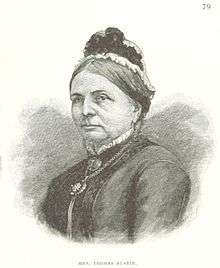Elizabeth Austin (Australian pioneer)
| Elizabeth Phillips Austin | |
|---|---|
 | |
| Born |
14 August, 1821 The Chinnocks |
| Died |
2 September, 1910 Winchelsea |
| Nationality | Australian |
| Known for | benefactor |
| Children | eleven |
Elizabeth Phillips Austin, née Harding (14 August 1821- 2 September 1910), was an Australian pioneer and philanthropist, who endowed hospitals in the state of Victoria.[1][2]
Life
Austin was born at Chinnock, Somerset, England, and took passage to Australia in 1841 with her brother William and squatted land near Winchelsea, in the Western District of what later became Victoria.
In 1845 she married Thomas Austin who had also migrated from Somerset. They had eleven children with three dying in infancy. They were successful in sheep farming and owned several ' runs' becoming a notable family of the district. They received a visit from the Duke of Edinburgh to their homestead in 1867.[3]
Following Thomas' death in 1871 she continued to run the farms she owned.
Legacy
Witnessing the death of a servant from an incurable disease she became involved in setting up a hospital for 'Incurables ' in Melbourne. She supported this institution for the rest of her life and created similar hospitals in other parts of Victoria.[4]
In recognition of her work the City of Greater Geelong has named one of the wards of the city after Austin.
References
- ↑ Serville, Paul H. De. Austin, Elizabeth Phillips (1821–1910). Canberra: National Centre of Biography, Australian National University.
- ↑ "Austin, Elizabeth Phillips (1821-1910)", Trove, 2009, retrieved 2016 Check date values in:
|access-date=(help) - ↑ Swain, Shurlee (2014). "Austin, Elizabeth". The Encyclopedia of Women and Leadership in Twentieth-Century Australia. Australian Women's Archives Project.
- ↑ "Obituary - Elizabeth Phillips Austin - Obituaries Australia". oa.anu.edu.au. Retrieved 2016-07-12.